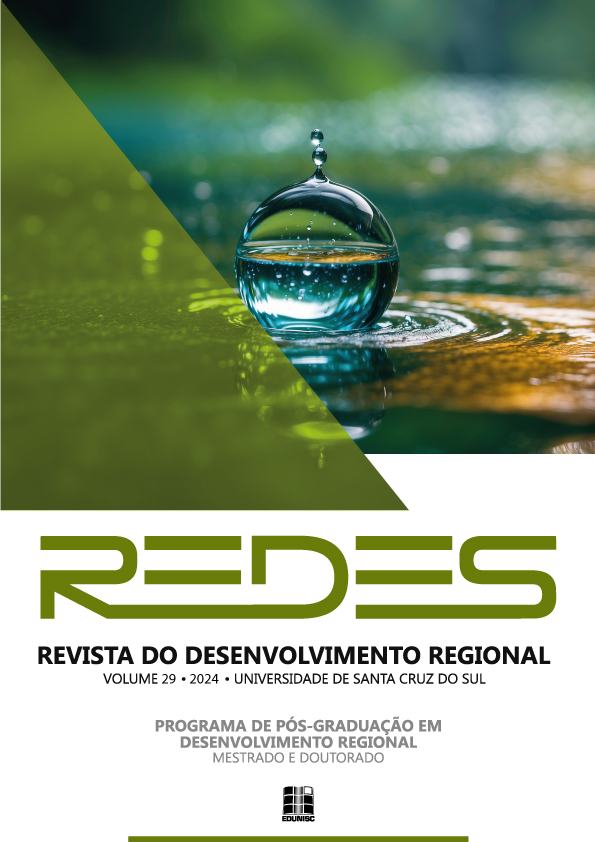Federal Government Actions in Supporting the Reconstruction of Rio Grande do Sul/Brazil:
An Analysis of Public Policies
DOI:
https://doi.org/10.17058/redes.v29i1.19665Keywords:
Public Policies, Climate Change, Crisis PlanningAbstract
The floods of May 2024 in Rio Grande do Sul resulted in severe impacts on infrastructure and public health, exposing vulnerabilities and challenges for economic recovery. This study explores the strategies implemented by the federal government, focusing on the allocation of resources for post-disaster recovery, particularly in the areas of housing and economic impacts. The research employed a mixed-methods approach, combining documentary analysis of official reports and scientific articles by experts. Economic and public health data were collected to assess the effects of the floods and the effectiveness of recovery measures. The results indicated the relative effectiveness of some policies, particularly those of medium and long-term scope, while highlighting the socioeconomic vulnerability of low-income populations and the challenges faced by key economic sectors in pursuing economic recovery.
Downloads
References
ABREU, M. C., et al. Sustentabilidade e reconstrução pós-desastres: um estudo de caso. Revista de Gestão Ambiental, v. 23, n. 3, p. 45-58, 2019.
ALEXANDER, D. Principles of Emergency Planning and Management. Terra Publishing, 2002.
BRASIL. Governo anuncia pacote de R$ 50 bilhões em suporte ao Rio Grande do Sul. Planalto, Brasília, 2024. Disponível em: https://www.gov.br/planalto/pt-br/acompanhe-o-planalto/noticias/2024/05/governo-anuncia-pacote-de-r-50-bilhoes-em-suporte-ao-rio-grande-do-sul. Acesso em: 29 jul. 2024.
COVELLO, V. “Risk comparison and risk communication”. In: KASPERSON, R.; STALLEN, P. (Eds.). Communicating Risk to the Public. Kluwer, 1992.
DAUPHINÉ, A. Risques et Catastrophes. Arman Collin, 2001.
FREITAS, A. C.; LIMA, R. P. Participação comunitária na gestão de desastres: teoria e prática. Cadernos de Estudos Sociais, v. 35, n. 1, p. 99-117, 2023.
GARCIA, M. C.; PEREIRA, R. S.; SILVA, J. R. Long-term impacts of disaster recovery policies: An empirical study. Disaster Prevention and Management, v. 29, n. 3, p. 373-386, 2020. DOI: 10.1108/DPM-09-2019-0290.
GOMES, F. S., et al. Financiamento da reconstrução pós-desastres: desafios e soluções. Revista de Economia e Administração, v. 17, n. 4, p. 78-94, 2020.
HAN, J.; KAMBER, M.; PEI, J. Data Mining: Concepts and Techniques. Morgan Kaufmann, 2011.
IPCC. Sixth Assessment Report. Geneva: Intergovernmental Panel on Climate Change, 2021.
JURAFSKY, D.; MARTIN, J. H. Speech and Language Processing. Pearson, 2021.
KIM, H.; LEE, S.; KIM, D. Economic impact analysis of government policies: A systematic review. Economic Policy Review, v. 24, n. 1, p. 45-67, 2018. DOI: 10.1007/s12076-017-0198-5.
LE MAURICIEN., 2013. “Catastrophe Naturelle : deux exercices de simulation ce weekend” . Le Mauricien, 29th June 2013.
LIU, Y.; ZHANG, X.; LI, P. Financial allocations and management in crisis contexts: A review. Public Finance Review, v. 45, n. 4, p. 590-607, 2017. DOI: 10.1177/1091142117713622.
MACHADO, P. R., et al. Políticas públicas estaduais para a reconstrução pós-desastres no Rio Grande do Sul. Relatório Técnico do Governo do Estado do Rio Grande do Sul, 2024.
MILETI, D. S.; SORENSEN, J. H. Communication of Emergency Public Warnings: A Social Science Perspective and State-of-the-Art Assessment. Oak Ridge National Laboratory, 1990.
PROAG, S. L.; PROAG, V. A Framework for Risk Assessment. Procedia Economics and Finance, v. 18, p. 206-213, 2014. DOI: 10.1016/S2212-5671(14)00932-0.
REYNOLDS, B.; SEEGER, M. W. Crisis and emergency risk communication as an integrative model. Journal of Health Communication, v. 10, n. 1, p. 43-55, 2005. DOI: 10.1080/10810730590904571.
SALTON, G.; BUCKLEY, C. Term-weighting approaches in automatic text retrieval. Information Processing & Management, v. 24, n. 5, p. 513-523, 1988. DOI: 10.1016/0306-4573(88)90021-0.
SILVA, A. F. de; MENDES, R. M.; DOURADO, F. Gestão de desastres no Brasil: os planos de emergência e contingência em esferas estaduais e as Geociências. Ciência e Natura, Santa Maria, v. 45, e74244, 2023. DOI: 10.5902/2179460X74244.
SILVA, H. L., et al. Resposta municipal às enchentes de 2024 no Rio Grande do Sul. Revista de Planejamento Urbano, v. 28, n. 2, p. 59-74, 2024.
SKIDMORE, M.; TOYA, H. Do Natural Disasters Promote Long-Run Growth? Economic Inquiry, v. 40, n. 4, p. 664-687, 2002.
SOUZA, M. T.; ALMEIDA, R. F. Políticas federais para a gestão de desastres no Brasil. Revista Brasileira de Política Pública, v. 8, n. 1, p. 34-50, 2022.
STIGLITZ, J. E. Freefall: America, Free Markets, and the Sinking of the World Economy. W.W. Norton & Company, 2010.
UNESCO. Water – A Shared Responsibility. Berghahn Books, 2006.
WANG, T.; LI, J.; ZHANG, S. A clustering approach to evaluate public policies: Methodology and application. Public Administration Quarterly, v. 40, n. 2, p. 152-168, 2016. DOI: 10.1016/j.paq.2015.12.001.
WRIGHT, G. Disaster Resilience: A National Imperative. National Academies Press, 2013.
ZHANG, Y., et al. Sustainable disaster recovery: a comparative study of recovery plans in China. Journal of Urban Planning and Development, v. 143, n. 2, p. 67-80, 2017.
ZHOU, Y.; CHEN, Z.; WU, J. Implementation complexity in public policy: A comprehensive framework. Policy Studies Journal, v. 47, n. 4, p. 931-951, 2019. DOI: 10.1111/psj.12352.



